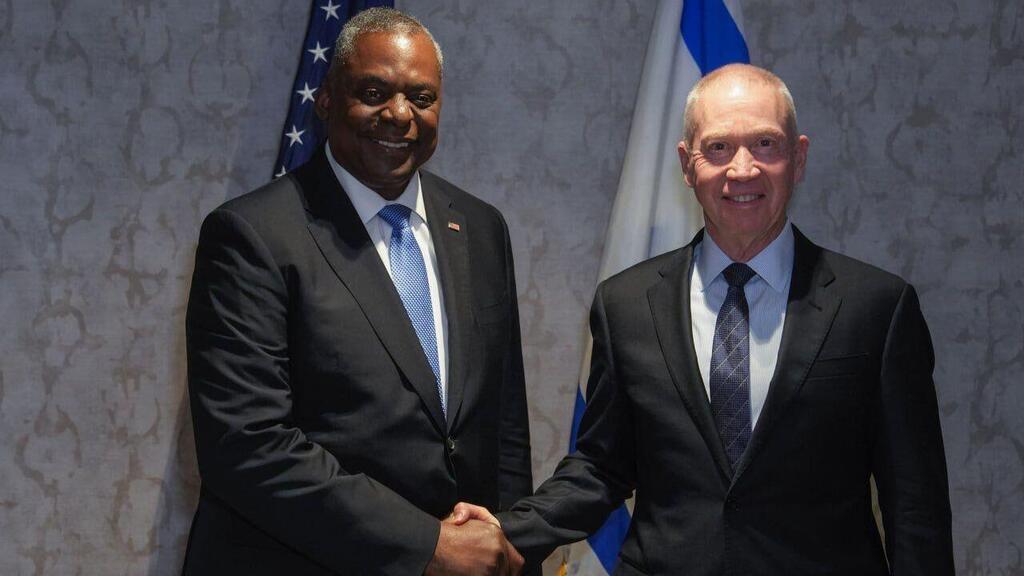The United States will not cut military aid to Israel in the wake of the Knesset's final approval of the first law of the judicial overhaul, which will limit the Supreme Court's oversight ability. The passage of legislation to cancel the reasonableness standard also will not harm the special relationship between the United States and Israel, Deputy Spokesman for the US State Department Vedant Patel told reporters on Tuesday.
Read more:
“There is not going to be any cut or stoppage of military aid, and that is because our commitment to Israel and our commitment to Israel’s security is ironclad. Our decades-long partnership with Israel is ironclad,” Patel said during the department's daily briefing.
2 View gallery


US Defense Secretary Lloyd Austin and Israel's Yoav Gallant discussed the passage of the judicial reform legislation
(צילום: אלעד מלכה)
"We understand that the talks on attempts at a compromise on judicial reform will continue in the coming weeks and months with the aim of reaching a consensus through dialogue. I am not one to speculate about the success of the talks, but there are internal talks, in order to reach a broader consensus," he said.
"It is clear that the legislation has consequences for people's day-to-day lives, and that is why we said that such changes in democracy require a broad consensus," he added.
Meanwhile, US Defense Secretary Lloyd Austin spoke by phone on Tuesday evening with Defense Minister Yoav Gallant, who tried on Monday on the floor of the Knesset plenum without success to slightly soften the law on the elimination of the reasonableness standard – and emphasized to him the need for a broad consensus in Israel. This was the first conversation between an American and Israeli senior official after the approval of the law.
According to the Pentagon's readout of the conversation, Austin "underscored the United States' belief that broad consensus through political dialogue, especially in the coming weeks and months, are critical elements of a resilient democracy."
2 View gallery


Yoav Gallant tried on the floor of the Knesset plenum without success to slightly soften the judicial reform legislation
(Photo: Reuters/Amir Cohen)
In the conversation Gallant said, according to his office, that "my main task, together with the heads of the defense establishment, is to unite the ranks and maintain the IDF's competence in the face of the many security challenges." Gallant also said that "Israel is a strong democracy, and it will remain so in the future." According to Gallant's office, the two military leaders also discussed the regional challenges and the state of the Israel Defense Forces military preparedness.
Austin reiterated in the conversation that the "U.S. commitment to Israel's security is steadfast and unwavering, and affirmed that the Department of Defense is focused on initiatives that deepen military cooperation."
The two also discussed IDF activities in Jenin in the West Bank. Gallant said that, as far as the security system is concerned, a functioning Palestinian Authority carrying out its tasks in its territory is an Israeli security interest. At the same time, he emphasized that wherever the Palestinian Authority does not have control, the IDF will continue to operate at all times.
Austin urged Gallant "to address extremist settler violence against Palestinian civilians and continue the Israeli Ministry of Defense’s efforts to improve economic opportunities for Palestinians in the West Bank."
Gallant brought up in the conversation the importance of completing the sale of the Arrow 3 system from Israel to Germany for the defense establishment. He thanked Austin for their extensive support for Israel's security and their commitment to preserving the qualitative advantage of the security system throughout the Middle East.
Also on Tuesday, France's Foreign Affairs Ministry said in a statement on the push for a judicial overhaul that "France has a deep affinity for the democratic principles that form the basis of its friendship with Israel since its independence. It calls on the Israeli authorities to deal with any fundamental issue concerning the institutions of democratic countries in a spirit of consensus. The passage of a law limiting the rights of the Supreme Court by the Knesset on July 24, despite the loud voices of protest that are heard, moves away from this spirit."

